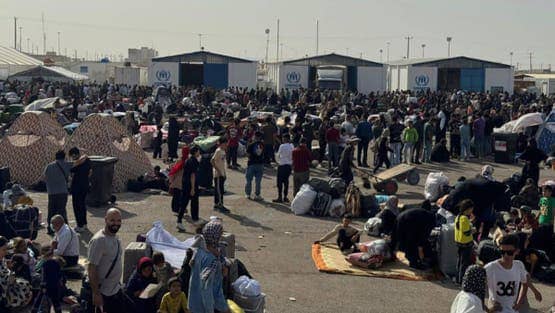Iran Deports Over 300,000 Afghans in Two Weeks, UN Warns of Humanitarian Crisis

Amid escalating forced deportation operations, over 300,000 Afghans have arrived at the Islam Qala border crossing in Herat province in the past 12 days, according to local officials. The UN High Commissioner for Refugees has expressed concern over the deteriorating humanitarian situation, warning of the depletion of resources allocated to assist returnees.
Ahmadullah Motaki, head of culture and media in Herat province, confirmed that "over 300,000 people entered Afghanistan through the Islam Qala crossing in 12 days," noting that "around 38,000 of them returned last Friday, including 24,000 forcibly deported by Iranian authorities."
According to statistics, the number of returnees has increased from 3,000 people per day in early April to over 35,000, mostly families and children, putting pressure on basic services in Afghanistan.
In a statement issued on Saturday, the UNHCR warned of the worsening crisis, stating that "the humanitarian situation is critical, especially with shortages in shelter, healthcare, drinking water, and employment opportunities." The statement added: "Our teams are making every effort to provide assistance, but resources are running out. We urgently need help to continue supporting returnees."
The UNHCR explained that the return of over 1.4 million Afghans this year _including those forcibly deported_ has put the country in a "very difficult position," with expectations of a deteriorating situation in the coming months.
Human rights organizations and international entities have described Iran's actions as "contrary to humanitarian values," especially after the spread of footage on social media showing Iranian citizens in Balochistan providing food and water to detained Afghans in deportation camps.
Returning Afghans have reported that "the treatment in Iran was not humane," and some were deported despite having legal documents. In reference to serious violations, Afghan activists have accused Iranian authorities of separating children from their families during deportation operations, exposing them to the risk of being lost or exploited.
The mass deportation comes following the escalation between Iran and Israel, which coincided with an intense Iranian campaign against Afghans residing on its territory. Afghanistan _already facing economic and political crises_ is now confronted with unprecedented challenges in accommodating this huge number of returnees, amid warnings of long-term humanitarian repercussions.